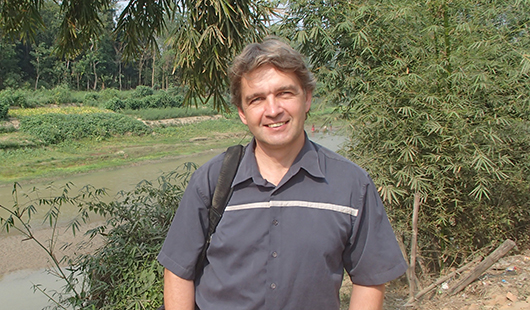
A project aimed at strengthening epidemiology training in Asia Pacific has received a significant boost with a five-million-dollar funding grant from the Department of Foreign Affairs and Trade.
The funding marks the beginning of the second phase of the Asia Pacific Consortium of Veterinary Epidemiology (APCOVE), which will provide applied field training and eLearning opportunities to boost veterinary epidemiology and One Health capacity in eight countries across the region.
The University of Queensland has received about $500,000 as part of the funding, with Professor Joerg Henning leading simulation exercises of animal disease outbreaks and field research projects in Cambodia, Laos, Papua New Guinea and Timor Leste.
“Building on the foundations and partnerships established during the first phase of APCOVE, the funding will enhance the animal health workforce's ability to prevent, detect, and respond to animal disease outbreaks,” Professor Henning said.
“This project is critical in training 'animal-disease detectives,' and aims to safeguard both animals and humans from the threat of future pandemics.
"In recent decades, an alarming surge in infectious diseases has seen over 75 per cent of these diseases in humans originating in animal populations.
"Countries worldwide are grappling with devastating outbreaks, from the COVID-19 pandemic to African swine fever, and most recently new avian flu infections.
“In our increasingly connected world, where people and goods move effortlessly across borders, preparedness is essential to combat current and future outbreaks.
“Strengthening epidemiologic capabilities is imperative for developing comprehensive responses to the complex challenges of infectious disease outbreaks.”
The APCOVE project brings together 40 veterinary epidemiologists from around the world who have collaboratively developed both digital and in-person training resources for veterinarians.
“This training will strengthen the capacity of the veterinary workforce in the target countries to respond, control, and prevent animal disease emergencies,” Professor Henning said.
“These regions have historically been hotspots for zoonotic and other destructive animal diseases with impacts extending well beyond their national borders.”
Professor Henning said the initiative provides education and development opportunities in these burgeoning nations and said sharing this knowledge aligns with Australia's national interest.
"There is a significant risk of emerging infectious diseases reaching Australia – pathogens do not respect national borders," he said.
“By enhancing these capabilities, we hope to create a more resilient animal health workforce in the Asia Pacific, ultimately contributing to the prevention of future zoonotic disease outbreaks.”
The APCOVE project is built upon the One Health approach, a collaborative effort to work across different sectors, such as public health, animal health, plant health and the environment, and on a local, national, and global level, to attain optimal health for people, animals and our environment.
This project, led by The University of Sydney, will involve, in addition to The University of Queensland, collaborative efforts by other universities (The University of Melbourne, The University of Adelaide, Charles Sturt University, Murdoch University, James Cook University, Massey University of New Zealand) and will work with government and university partners in the project countries.
Media: Faculty of Science Media, science.media@uq.edu.au, +61 438 162 687.



